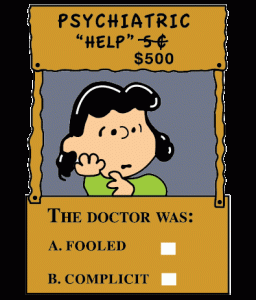May 21, 2012
#OccupyAPA: Mad Power, Mad Pride, Mad Action
 Last weekend I went down to Philly to Occupy the American Psychiatric Association’s yearly conference (#OccupyAPA). I joined the protests on Saturday, attended the APA on Sunday, and participated in the Radical Caucus, hosted by a group of psychiatrists attending the conference on Sunday night. The weekend was overflowing with information and emotion, and I when I finishing unpacking it all I might just have a dissertation (or, at least a fat chapter).
Last weekend I went down to Philly to Occupy the American Psychiatric Association’s yearly conference (#OccupyAPA). I joined the protests on Saturday, attended the APA on Sunday, and participated in the Radical Caucus, hosted by a group of psychiatrists attending the conference on Sunday night. The weekend was overflowing with information and emotion, and I when I finishing unpacking it all I might just have a dissertation (or, at least a fat chapter).
This year’s APA was especially controversial since the DSM5 is scheduled to be published in 2013. Over a decade in production, and already delayed more than once, the DSM5 is, in a word, disastrous. Many psychiatrists, including the lead author of DMS-IV, have spoken out vehemently against both the processes and outcomes of DSM5.
[CALL TO ACTION: The final round of public comments on DSM5 is now open, until June 15th, 2012.]
 The controversies around DSM-5 coupled with the energy of Occupy Wall Street, brought activists and the media out in force. The Philadelphia Inquirer ran a front page story on the protests (Former patients protest psychiatric convention), New Scientist covered the protests alongside their DSM coverage (Label jars not people), The Grey Lady covered and opined the DSM disaster (though not the protests), the BBC was filming, NPR was recording, and at least 2 documentary film crews (Cause of Death: Unknown), and a multitude of citizen journalists captured and reported on the actions.
The controversies around DSM-5 coupled with the energy of Occupy Wall Street, brought activists and the media out in force. The Philadelphia Inquirer ran a front page story on the protests (Former patients protest psychiatric convention), New Scientist covered the protests alongside their DSM coverage (Label jars not people), The Grey Lady covered and opined the DSM disaster (though not the protests), the BBC was filming, NPR was recording, and at least 2 documentary film crews (Cause of Death: Unknown), and a multitude of citizen journalists captured and reported on the actions.
Saturday morning kicked off at Quaker Friend’s Center, with a powerful lineup of psychiatric survivors firing up the protesters with speeches, songs, and changes. Hundreds of protestors marched through the streets of Philly to the main convention center, many wearing psychopharmacomania t-shirts, and holding creatively maladjusted signs.
The protest culminated in a label rip, staged outside of the main convention center (The Alchemist makes an appearance at 2:25, warning that psychiatry is a threat to itself and to others).:
The Icarus Project represented, and we were thrilled to distribute physical copies of the eagerly anticipated Mindful Occupation to protestors, psychiatrists, and the media.
The protests were a rush, but for me, the surprise thrill was gaining admission to the APA conference itself on Sunday. I attended a few talks and a poster session, irrefutably detailing and confirming my research and predictions. Then I hit paydirt. The vendor exhibition hall. HOLY FUCK. Highlights included:
Future Blockbuster? Anti-psychotic action in 3D:
A live psychiatrist, hired by AstraZeneka, delivering their powerpoint presentation (she only squirmed a little when I asked her if this was the drug that killed 3-year old Rebecca Reilly):
and devices that only psychiatry can dream up uses for:
The Radical Caucus deserves a follow-up post of of its own. For starters, Brad Lewis’ brilliant breakdown seamlessly applies the hard-fought lessons of academic theory to the trenches of emotionally-loaded, real-life conflict. I have much more to say about this meeting, but first I need to track down who swallowed the comment that I posted in response to Brad’s post ;-).
For now, I’ll leave you with a teaser for next year’s APA: “Pursuing Wellness Across the Lifespan” – I guess that covers kids, the elderly, vets, prisoners, pregnant women, and whoever else is ensnared by DSM-5’s diagnostic nets (including the appendix).
 Filed by Jonah at 12:01 am under dangerousgifts,ethics,fire
Filed by Jonah at 12:01 am under dangerousgifts,ethics,fire
No Comments







 1 Comment
1 Comment
 In a
In a On September 17th 2011, sleeping giants stirred as the perception of social and and economic injustice in the US finally crossed a critical threshold. And the people spoke.
On September 17th 2011, sleeping giants stirred as the perception of social and and economic injustice in the US finally crossed a critical threshold. And the people spoke. I just returned from the eduventure of a lifetime in Palestine and Israel. I travelled to the Palestine Technical University of
I just returned from the eduventure of a lifetime in Palestine and Israel. I travelled to the Palestine Technical University of 





